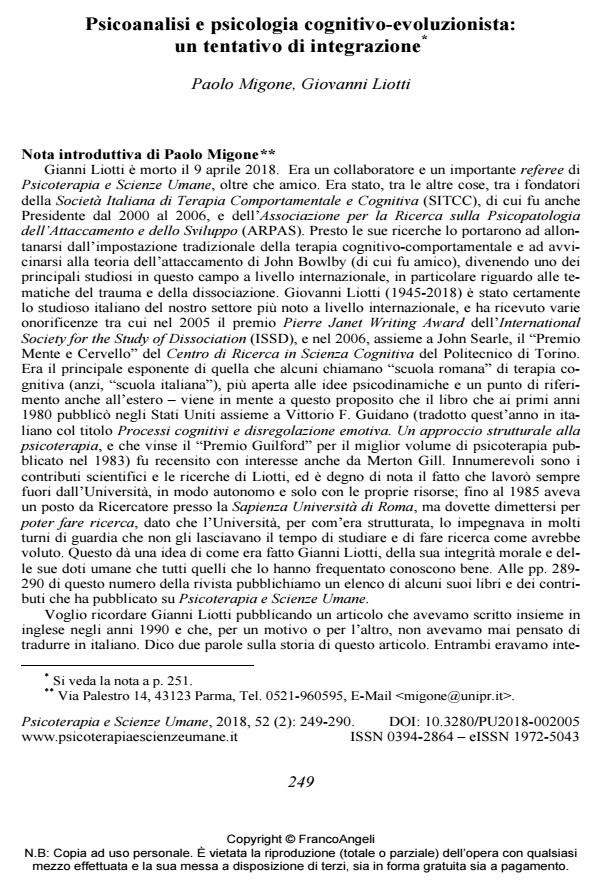Psychoanalysis and cognitive-evolutionary psychology: An attempt at integration
Journal title PSICOTERAPIA E SCIENZE UMANE
Author/s Paolo Migone, Giovanni Liotti
Publishing Year 2018 Issue 2018/2
Language Italian Pages 42 P. 249-290 File size 178 KB
DOI 10.3280/PU2018-002005
DOI is like a bar code for intellectual property: to have more infomation
click here
Below, you can see the article first page
If you want to buy this article in PDF format, you can do it, following the instructions to buy download credits

FrancoAngeli is member of Publishers International Linking Association, Inc (PILA), a not-for-profit association which run the CrossRef service enabling links to and from online scholarly content.
The abandonment of the theory of trauma in 1897 was a trauma for Freud himself, who was led to "despair", and possibly reacted with an overemphasis on inner fantasies and drive theory. In a way, today we are facing a second trauma in the history of psychoanalysis: we might call it the "abandonment of drive theory", i.e., human beings strive not primarily to reduce drives but rather in order to seek objects, assign meanings, and assimilate new schemas. The current challenge is a revision of the psychoanalytic theory of motivation based on converging evidence from cognitive science, ethology, infant research, and psychotherapy research. Among the many models currently suggested in contemporary psychoanalysis, Weiss & Sampson’s "Control-Mastery Theory" is discussed in light of cognitive science and evolutionary epistemology: namely, within the frame of the 1960 classic by Miller, Galanter & Pribram Plans and Structure of Behavior, Edelman’s neurobiological theory, and Bowlby’s attachment theory.
Keywords: Control-Mastery Theory; Psychotherapy integration; Psychoanalytic theory; Cognitive-evolutionary psychology; Gerald Edelman
- CBT Case Formulation as Therapeutic Process Benedetto Farina, pp.177 (ISBN:978-3-030-63586-2)
- Enactment, transfert e scomparsa del sintomo: un caso clinico Morris N. Eagle, in PSICOTERAPIA E SCIENZE UMANE 1/2025 pp.131
DOI: 10.3280/PU2025-001011 - La crisi della teoria freudiana delle pulsioni Paolo Migone, in PSICOBIETTIVO 3/2018 pp.48
DOI: 10.3280/PSOB2018-003005
Paolo Migone, Giovanni Liotti, Nota introduttiva di Paolo Migone. Psicoanalisi e psicologia cognitivo-evoluzionista: un tentativo di integrazione in "PSICOTERAPIA E SCIENZE UMANE" 2/2018, pp 249-290, DOI: 10.3280/PU2018-002005